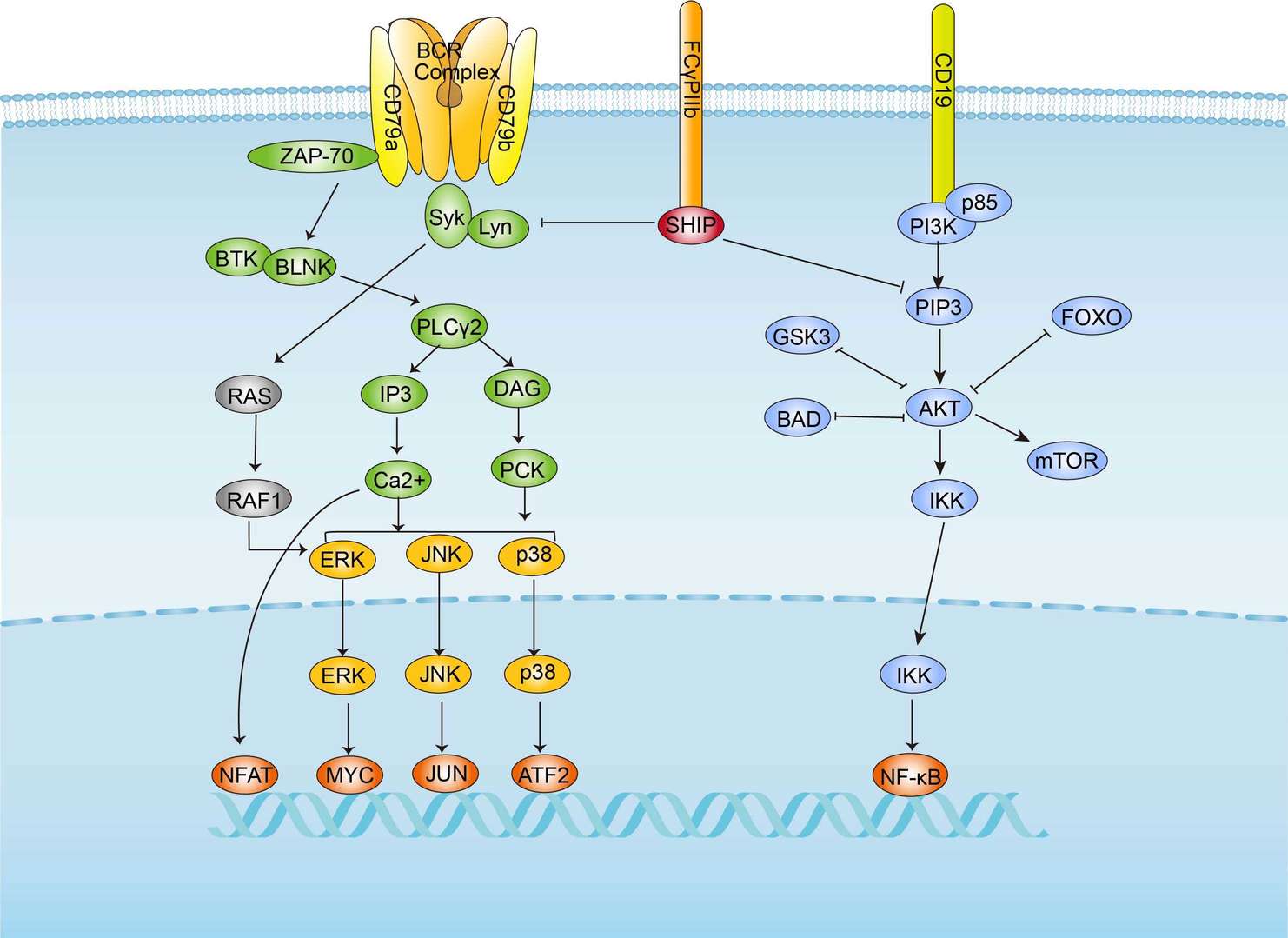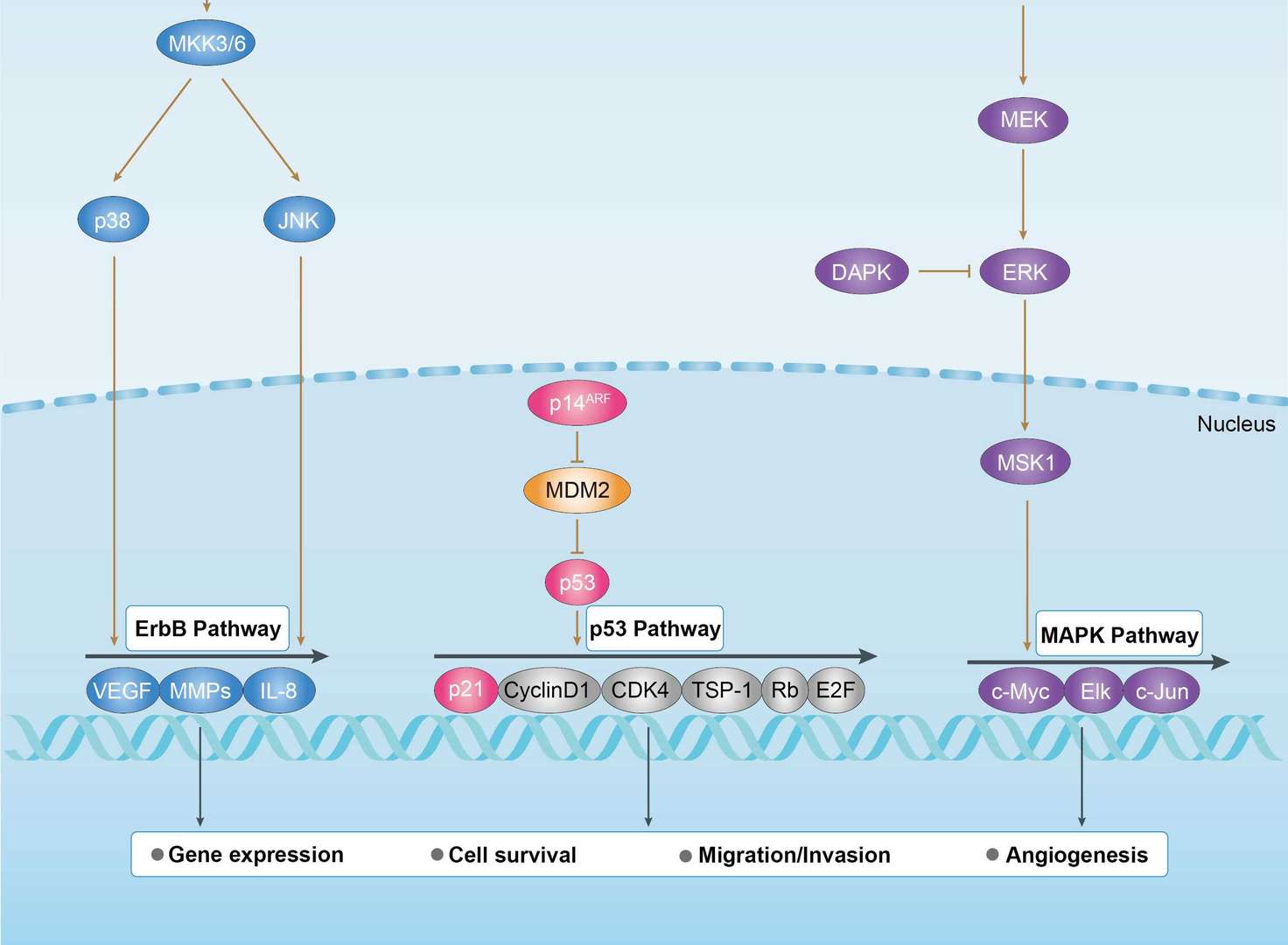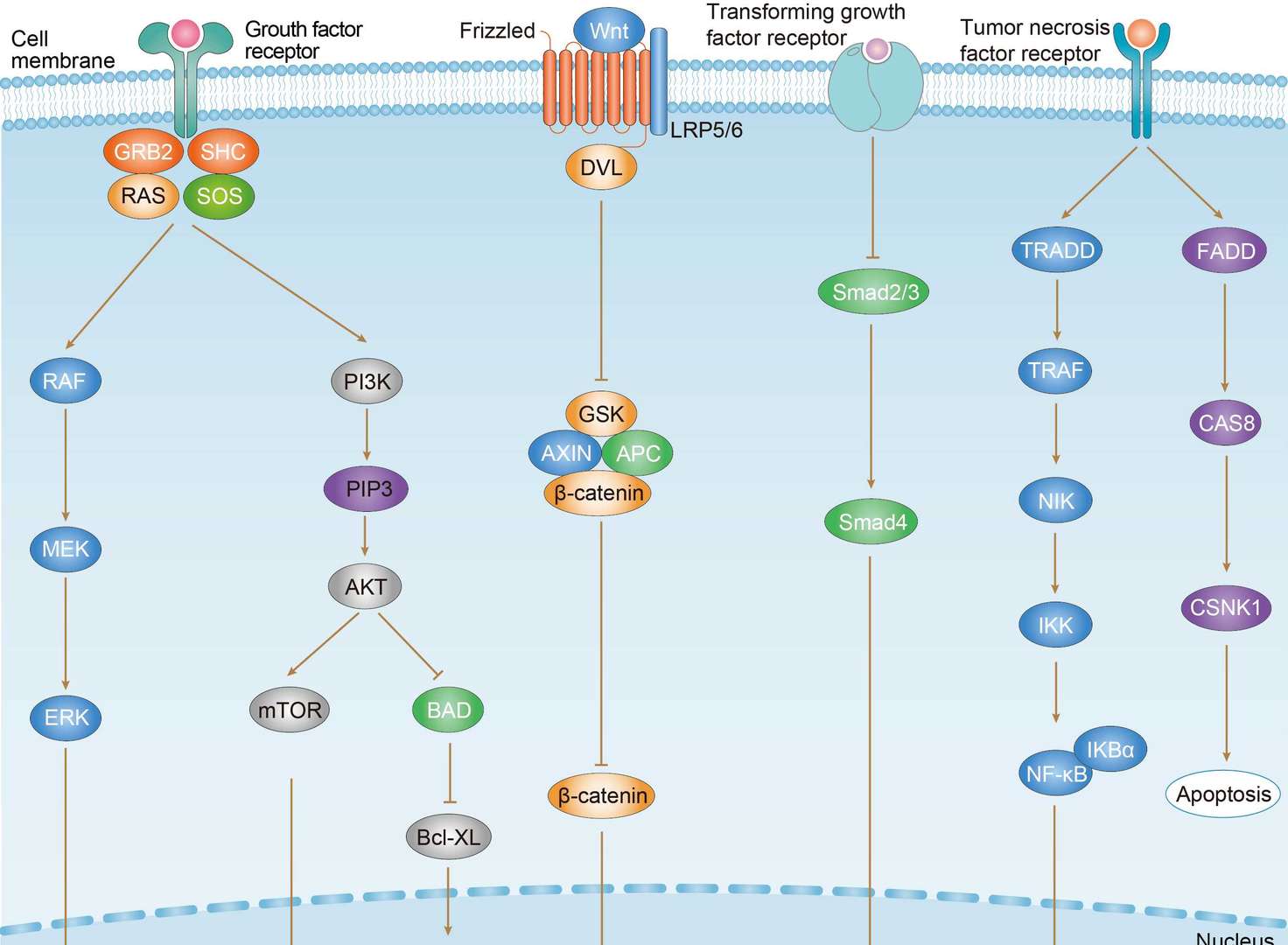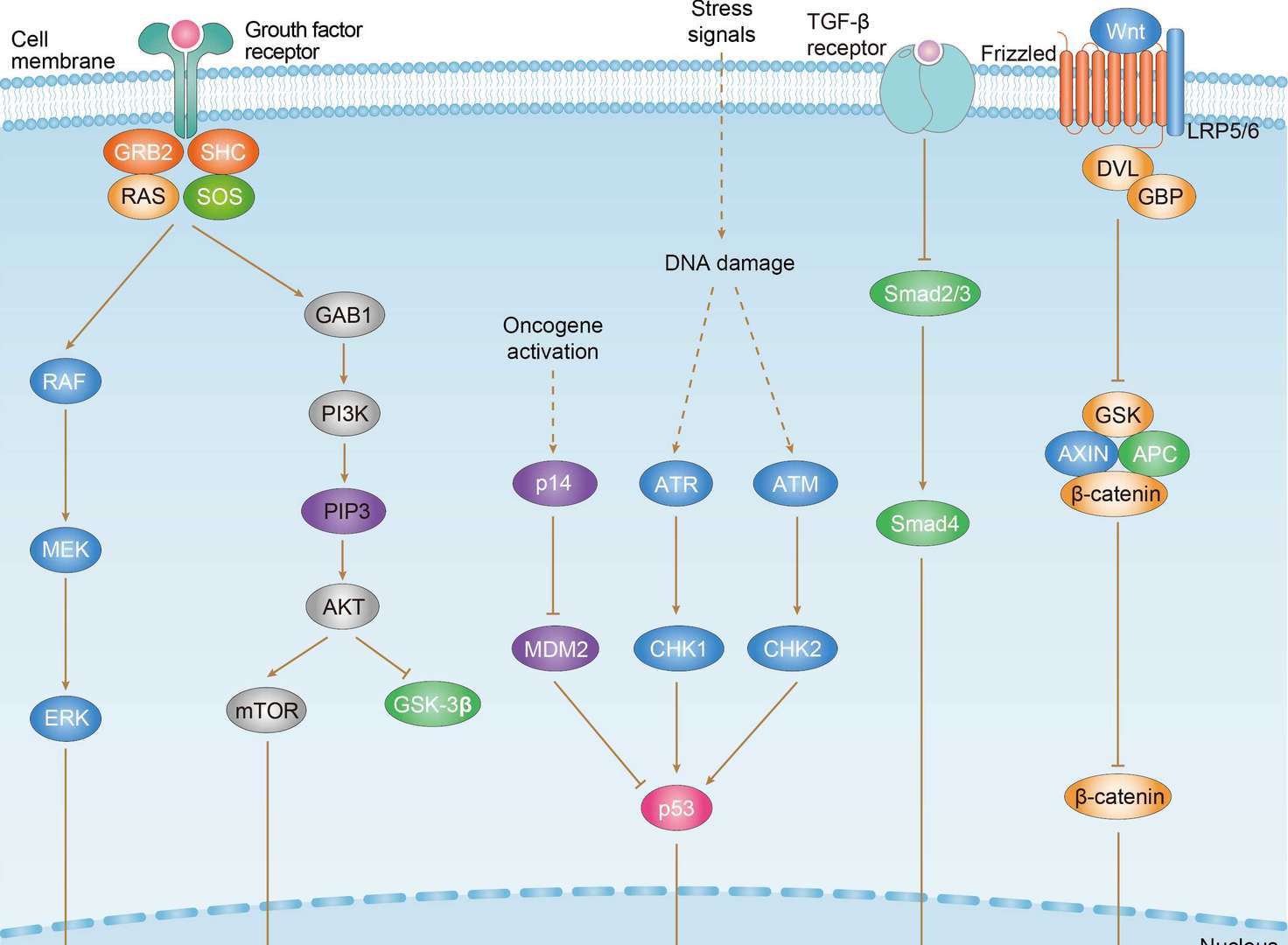Anti-MYC (clone W24V174) Recombinant Antibody Coupled Liposome (VS-1024-FY175)
CAT#: VS-1024-FY175
The anti-c-Myc antibody conjugated liposome demonstrates good targeting capabilities in the treatment of melanoma, effectively targeting and inhibiting the proliferation of tumor cells. c-Myc is an important transcription factor closely associated with the occurrence and development of tumors. The use of this liposome may enhance therapeutic effects while reducing toxicity to normal cells. Further research will help optimize its clinical application.













Specifications
- Potential Clinical Applications
- Melanoma
Product Composition
- Clone
- W24V174
- Antibody Type
- IgG
- Antibody Host
- Mouse
- Antibody Reactivity
- Human
- Antibody Description
- This product is a recombinant mouse monoclonal antibody that was specifically designed to bind to the c-Myc protein. c-Myc is a crucial transcription factor that plays a significant role in cell growth, proliferation, and differentiation. Due to its involvement in various cellular processes, dysregulation of c-Myc is often associated with several types of cancers.
Product Property
- Storage
- See in the COA
- Storage Shelf Time
- See in the COA
Target Information
- Target
- MYC
- Introduction
- This gene is a proto-oncogene and encodes a nuclear phosphoprotein that plays a role in cell cycle progression, apoptosis and cellular transformation. The encoded protein forms a heterodimer with the related transcription factor MAX. This complex binds to the E box DNA consensus sequence and regulates the transcription of specific target genes. Amplification of this gene is frequently observed in numerous human cancers. Translocations involving this gene are associated with Burkitt lymphoma and multiple myeloma in human patients. There is evidence to show that translation initiates both from an upstream, in-frame non-AUG (CUG) and a downstream AUG start site, resulting in the production of two isoforms with distinct N-termini.
- Alternative Names
- MYC Proto-Oncogene, BHLH Transcription Factor; V-Myc Avian Myelocytomatosis Viral Oncogene Homolog; Class E Basic Helix-Loop-Helix Protein 39; Transcription Factor P64; Proto-Oncogene C-Myc; BHLHe39; Myc-Related Translation/Localization Regulatory Factor
- Full Name
- MYC Proto-Oncogene, BHLH Transcription Factor
- Gene ID
- 4609
- UniProt ID
- P01106
- Cellular Localization
- Nucleus
- Post Translation Modifications
- Phosphorylated by PRKDC (PubMed:1597196).
Phosphorylation at Ser-329 by PIM2 leads to the stabilization of MYC (By similarity).
Phosphorylation at Ser-62 by CDK2 prevents Ras-induced senescence (PubMed:19966300, PubMed:20713526).
Phosphorylated at Ser-62 by DYRK2; this primes the protein for subsequent phosphorylation by GSK3B at Thr-58 (PubMed:22307329).
Phosphorylation at Thr-58 and Ser-62 by GSK3 is required for ubiquitination and degradation by the proteasome (PubMed:15103331, PubMed:17558397, PubMed:8386367).
Dephosphorylation at Ser-62 by protein phosphatase 2A (PPP2CA) promotes its degradation; interaction with PPP2CA is enhanced by AMBRA1 (PubMed:25803737, PubMed:25438055).
Ubiquitinated by the SCF(FBXW7) complex when phosphorylated at Thr-58 and Ser-62, leading to its degradation by the proteasome (PubMed:15103331, PubMed:17558397, PubMed:25775507).
In the nucleoplasm, ubiquitination is counteracted by USP28, which interacts with isoform 1 of FBXW7 (FBW7alpha), leading to its deubiquitination and preventing degradation (PubMed:17873522, PubMed:17558397).
In the nucleolus, however, ubiquitination is not counteracted by USP28 but by USP36, due to the lack of interaction between isoform 3 of FBXW7 (FBW7gamma) and USP28, explaining the selective MYC degradation in the nucleolus (PubMed:17558397, PubMed:25775507).
Also polyubiquitinated by the DCX(TRPC4AP) complex (PubMed:20551172, PubMed:29779948).
Ubiquitinated by TRIM6 in a phosphorylation-independent manner (By similarity).
- Protein Refseq
- NP_002458.2
- Function
- Transcription factor that binds DNA in a non-specific manner, yet also specifically recognizes the core sequence 5'-CAC[GA]TG-3' (PubMed:24940000, PubMed:25956029).
Activates the transcription of growth-related genes (PubMed:24940000, PubMed:25956029).
Binds to the VEGFA promoter, promoting VEGFA production and subsequent sprouting angiogenesis (PubMed:24940000, PubMed:25956029).
Regulator of somatic reprogramming, controls self-renewal of embryonic stem cells (By similarity).
Functions with TAF6L to activate target gene expression through RNA polymerase II pause release (By similarity).
Positively regulates transcription of HNRNPA1, HNRNPA2 and PTBP1 which in turn regulate splicing of pyruvate kinase PKM by binding repressively to sequences flanking PKM exon 9, inhibiting exon 9 inclusion and resulting in exon 10 inclusion and production of the PKM M2 isoform (PubMed:20010808).
Customer Review
There are currently no Customer reviews or questions for VS-1024-FY175. Click the button above to contact us or submit your feedback about this product.
Submit Your Publication
Published with our product? Submit your paper and receive a 10% discount on your next order! Share your research to earn exclusive rewards.
Related Signaling Pathways
Related Diseases
Downloadable Resources
Download resources about recombinant antibody development and antibody engineering to boost your research.
Datasheet
MSDS
COA
Certificate of Analysis LookupTo download a Certificate of Analysis, please enter a lot number in the search box below. Note: Certificate of Analysis not available for kit components.
See other products for "MYC"
Select a product category from the dropdown menu below to view related products.
| CAT | Product Name | Application | Type |
|---|---|---|---|
| PABL-281 | Mouse Anti-MYC Recombinant Antibody (clone 9E10) | WB, IHC, FuncS | Mouse IgG |
| CAT | Product Name | Application | Type |
|---|---|---|---|
| PSBL-281 | Mouse Anti-MYC Recombinant Antibody (clone 9E10); scFv Fragment | WB, IHC, FuncS | Mouse scFv |
| CAT | Product Name | Application | Type |
|---|---|---|---|
| PFBL-281 | Mouse Anti-MYC Recombinant Antibody (clone 9E10); Fab Fragment | WB, IHC, FuncS | Mouse Fab |
| CAT | Product Name | Application | Type |
|---|---|---|---|
| MOB-0400MC | Anti-c-Myc antibody (HRP) | ELISA, IHC-P, IHC-Fr, WB |
| CAT | Product Name | Application | Type |
|---|---|---|---|
| MOB-0268CT | Recombinant Mouse anti-Human MYC Monoclonal antibody (4H40) | ELISA, ICC, IF, IHC-P, IP, WB |
| CAT | Product Name | Application | Type |
|---|---|---|---|
| BRD-0380MZ | Chicken Anti-c-Myc (ab1) Polyclonal IgY | Indirect ELISA, WB | Chicken antibody |
| CAT | Product Name | Application | Type |
|---|---|---|---|
| BRD-0381MZ | Chicken Anti-c-Myc (ab2) Polyclonal IgY | WB | Chicken antibody |
| CAT | Product Name | Application | Type |
|---|---|---|---|
| MOR-2336 | Hi-Affi™ Recombinant Rabbit Anti-MYC Monoclonal Antibody (DS2336AB) | WB, IP, ICC | IgG |
| CAT | Product Name | Application | Type |
|---|---|---|---|
| MOR-4554 | Hi-Affi™ Recombinant Rabbit Anti-MYC Monoclonal Antibody (TH64DS) | WB, IF, ICC, FC | IgG |
| CAT | Product Name | Application | Type |
|---|---|---|---|
| FAMAB-0112-CN | Mouse Anti-MYC Recombinant Antibody (clone CT14) | ELISA, WB, FC, Inhib | Mouse IgG2a |
| CAT | Product Name | Application | Type |
|---|---|---|---|
| FAMAB-0112-CN-S(P) | Mouse Anti-MYC Recombinant Antibody (clone CT14); scFv Fragment | ELISA, WB, FC | Mouse scFv |
| CAT | Product Name | Application | Type |
|---|---|---|---|
| FAMAB-0112-CN-F(E) | Mouse Anti-MYC Recombinant Antibody (clone CT14); Fab Fragment | ELISA, WB, FC | Mouse Fab |
| CAT | Product Name | Application | Type |
|---|---|---|---|
| MRO-1778-CN | Rabbit Anti-MYC Polyclonal Antibody (MRO-1778-CN) | WB | Rabbit IgG |
| CAT | Product Name | Application | Type |
|---|---|---|---|
| MRO-1779-CN | Rabbit Anti-MYC Polyclonal Antibody (MRO-1779-CN) | WB | Rabbit IgG |
| CAT | Product Name | Application | Type |
|---|---|---|---|
| MOR-0050-FY | Rabbit Anti-MYC Recombinant Antibody (clone AFY0021) | ICC, IHC, WB | Rabbit IgG |
| CAT | Product Name | Application | Type |
|---|---|---|---|
| VS-0424-XY194 | AbPlus™ Anti-MYC Magnetic Beads (33) | IP, Protein Purification |
| CAT | Product Name | Application | Type |
|---|---|---|---|
| VS-1024-XY133 | Mouse Anti-NHP MYC Recombinant Antibody (clone MYC699) | IF, FC, ELISA | Mouse IgG1, kappa |
| CAT | Product Name | Application | Type |
|---|---|---|---|
| VS-0525-XY4607 | Anti-MYC Immunohistochemistry Kit | IHC |
| CAT | Product Name | Application | Type |
|---|---|---|---|
| VS-0525-XY4608 | Anti-Human MYC Immunohistochemistry Kit | IHC |
| CAT | Product Name | Application | Type |
|---|---|---|---|
| VS-0525-XY4609 | Anti-Mouse MYC Immunohistochemistry Kit | IHC |
| CAT | Product Name | Application | Type |
|---|---|---|---|
| VS-0825-YC263 | SmartAb™ Recombinant Anti-MYC pH-dependent Antibody (Clone CT14) | ELISA, WB, FC, Inhib | Mouse IgG2a |
| CAT | Product Name | Application | Type |
|---|---|---|---|
| VS-1025-YC55 | Anti-MYC Antibody Prodrug, Protease Activated (CT14) | ISZ, Cyt, FuncS |
| CAT | Product Name | Application | Type |
|---|---|---|---|
| VS-1225-XY152 | Mouse Anti-MYC Recombinant Antibody (VS-1225-XY152) | WB, IHC, FC | Mouse IgG1 |
| CAT | Product Name | Application | Type |
|---|---|---|---|
| VS-1225-XY153 | Rat Anti-MYC Recombinant Antibody (VS-1225-XY153) | WB, IP | Rat IgG2a |
| CAT | Product Name | Application | Type |
|---|---|---|---|
| VS-1225-XY154 | Mouse Anti-MYC Recombinant Antibody (VS-1225-XY154) | WB, IHC | Mouse IgG1 |
| CAT | Product Name | Application | Type |
|---|---|---|---|
| VS-1225-XY155 | Mouse Anti-MYC Recombinant Antibody (VS-1225-XY155) | WB, IHC, ICC, IF, FC, IP | Mouse IgG1, kappa |
| CAT | Product Name | Application | Type |
|---|---|---|---|
| VS-1225-XY156 | Mouse Anti-MYC Recombinant Antibody (VS-1225-XY156) | WB, IHC, FC, ELISA, IP, ChIP | Mouse IgG2a, kappa |
Popular Products

Application: WB, ELISA, IP, FC, FuncS, Neut, IF

Application: ELISA, IP, FC, FuncS, Neut, IF, WB

Application: WB, IP, IF, FuncS, FC, Neut, ELISA

Application: FC, IP, ELISA, Neut, FuncS, IF, ICC

Application: IP, IF, FuncS, FC, Neut, ELISA, IHC

Application: WB, ELISA, FuncS

Application: WB, Neut, FuncS
For research use only. Not intended for any clinical use. No products from Creative Biolabs may be resold, modified for resale or used to manufacture commercial products without prior written approval from Creative Biolabs.
This site is protected by reCAPTCHA and the Google Privacy Policy and Terms of Service apply.
















 BCR Signaling Pathway
BCR Signaling Pathway
 Bladder Cancer
Bladder Cancer
 Breast Cancer
Breast Cancer
 Colorectal Cancer
Colorectal Cancer
 Gastric Cancer
Gastric Cancer


-2.png)











